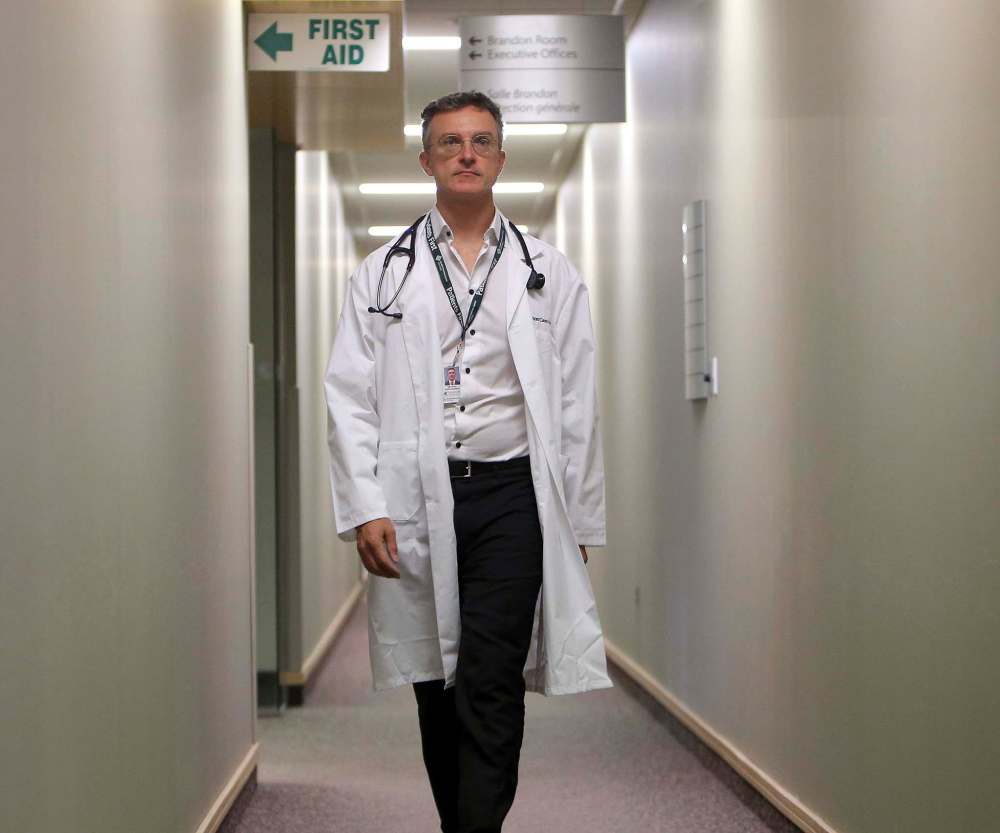Study led by Winnipeg doctor shows blood-thinner can keep COVID-19 patients out of ICU
Read this article for free:
or
Already have an account? Log in here »
To continue reading, please subscribe:
Monthly Digital Subscription
$0 for the first 4 weeks*
- Enjoy unlimited reading on winnipegfreepress.com
- Read the E-Edition, our digital replica newspaper
- Access News Break, our award-winning app
- Play interactive puzzles
*No charge for 4 weeks then price increases to the regular rate of $19.00 plus GST every four weeks. Offer available to new and qualified returning subscribers only. Cancel any time.
Monthly Digital Subscription
$4.75/week*
- Enjoy unlimited reading on winnipegfreepress.com
- Read the E-Edition, our digital replica newspaper
- Access News Break, our award-winning app
- Play interactive puzzles
*Billed as $19 plus GST every four weeks. Cancel any time.
To continue reading, please subscribe:
Add Free Press access to your Brandon Sun subscription for only an additional
$1 for the first 4 weeks*
*Your next subscription payment will increase by $1.00 and you will be charged $16.99 plus GST for four weeks. After four weeks, your payment will increase to $23.99 plus GST every four weeks.
Read unlimited articles for free today:
or
Already have an account? Log in here »
Hey there, time traveller!
This article was published 04/08/2021 (1598 days ago), so information in it may no longer be current.
A game-changing global study led by a Winnipeg physician has found that treating some hospitalized COVID-19 patients with blood thinners increases their chance of survival and reduces their need for intensive care.
The study looked at the effects of heparin, a generic blood thinner, in moderately and severely ill COVID-19 patients in nine countries. The research shows that the blood thinner helps moderately ill patients, but is harmful and should not be used in patients who are already on life-support. In patients who don’t yet need ICU care — receiving at most, supplemental oxygen — heparin helps to prevent serious blood-clot-related complications of COVID-19, such as thrombosis and organ failure, the new research shows.
The conclusion: blood thinners could reduce the need for ICU care in roughly 30 per cent of moderately ill patients.

Dr. Ryan Zarychanski, a Winnipeg hematologist, critical care physician and associate professor of internal medicine, University of Manitoba, is a senior author of the studies, which were published Wednesday in the New England Journal of Medicine.
The research shows it’s safe to give heparin to moderately ill COVID-19 patients. The findings are expected to quickly change the way COVID-19 patients are treated at the bedside because the medication is affordable and accessible. The results were announced in a livestreamed online broadcast Wednesday.
Zarychanski said the researchers are “very, very certain” of what he described as the straightforward findings of the trials.
“More patients will survive free of organ support. Less will be intubated, less will have thrombosis and there will be a small risk of major bleeding,” he said during the virtual broadcast.
The way the research was conducted is just as important as its findings, he said, because this shows global clinical trials can be done quickly and accurately.
“It certainly was an amazing experience over the last year, an exhausting one. You know, physicians hope that it could change practice, and we did this on a global scale. While the knowledge gained from this trial can change practice today, I do think it is the process of the (multi-platform trial) and the methods that will endure,” Zarychanski said.

“I think that trials will be developed with a spirit of global collaboration and that we will be able to answer questions more efficiently with methods that we, perhaps, created — did not perfect — but perhaps gave other people ideas to use as a springboard.”
Three large COVID-19 trials combined their data for this research. There were 2,219 moderately ill and 1,074 critically ill COVID-19 patients involved in the study, a small proportion of them from Canada.
It was the first time a multi-platform randomized clinical trial has ever been done during a pandemic, and the studies had more than 100 authors. Zarychanski is chair of the trial groups Antithrombotic Therapy to Ameliorate Complications of COVID-19 (ATTACC) and the Randomized, Embedded, Multi-factorial Adaptive Platform Trial for Community-Acquired Pneumonia (REMAP-CAP).
Winnipeg ICU physician Dr. Anand Kumar, another of the studies’ authors, said the results are a “big deal” for hospital capacity.
“The place where we’re tightest on capacity is ICU; if you can reduce the number of people who have to go to the ICU by 30 per cent, that has a really big impact on the health-system stability and our ability to respond to COVID.”
Before this, the effect of blood-thinners on COVID-19 patients hadn’t been proven. More research is needed into how to use heparin to treat patients whose conditions get progressively worse and begin to need ICU care, researchers said during the live broadcast.

katie.may@freepress.mb.ca
Twitter: @thatkatiemay

Katie May is a multimedia producer for the Free Press.
Our newsroom depends on a growing audience of readers to power our journalism. If you are not a paid reader, please consider becoming a subscriber.
Our newsroom depends on its audience of readers to power our journalism. Thank you for your support.
History
Updated on Wednesday, August 4, 2021 7:46 PM CDT: Adds link to broadcast of the trial results
Updated on Wednesday, August 4, 2021 8:22 PM CDT: Corrects the number of countries involved in the study.







